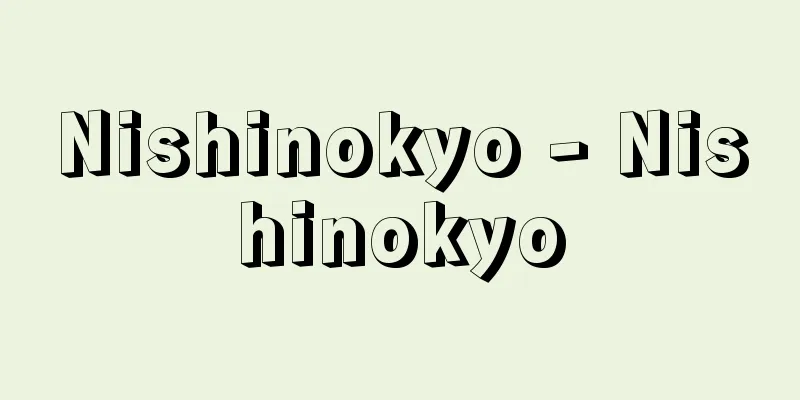Setsubun - Setsubun

[1] (meaning the turning point of the seasons)① The turning point of the seasons. The day when each of the four seasons turns into another. It refers to the day before the beginning of spring, summer, autumn, and winter. Setsubun. Setsubun. ※Mido Kanpakuki, Kanko 9th year (1012), December 13th "Today is the day before the nobles leave, so Setsubun is coming soon ." ※Eika (around 1028-92), Mine no Tsuki "Because the autumn Setsubun will come too soon, he sent them back by July 3rd."② Especially the day before the beginning of spring. There was a time when the turning point of the four seasons from winter to spring was considered the turning point of the year, and a New Year's Eve event similar to that of O-misoka is held. In modern times, on this night, a holly branch with a sardine head stuck on it is placed at the doorway, and roasted soybeans, called Setsubun beans, are scattered to ward off evil spirits. Setsubun. Setsubun. [Season: Winter] *Izumi Shikibushu (mid-11th century) Vol. 1: "Today, the ice on the reeds in the garden has thinned." *Ukiyo-zoshi: Seken Munesanyo (1692) Vol. 4: "Every year, the demon of Setsubun takes it home." [2] Kyogen. Various schools. On the night of Setsubun, the demon of Horai Island comes and wooed a woman who was not at home. The woman pretends to be swayed, and when she receives a hidden raincoat, a hidden hat, and a magic mallet, she throws beans to drive the demon away.Setsubun [Setsubun]Setsubun [Setsubun]Source: The Selected Edition of the Japanese Language Dictionary About the Selected Edition of the Japanese Language Dictionary Information |
[1] (季節の分かれ目の意)① 季節の変わり目。四季それぞれの季節の分かれる日。立春、立夏、立秋、立冬の前日をさす。せちぶ。せちぶん。※御堂関白記‐寛弘九年(1012)一二月一三日「公家荷前今日也、依二節分一早也」※栄花(1028‐92頃)峰の月「秋の節分にいと疾く入りぬべければとて、七月三日内に帰らせ給」② 特に立春の前日。四季のうち、冬から春になる時を一年の境と考えた時期があり、大晦日(おおみそか)と同類の年越行事が行なわれる。近代はこの夜、ヒイラギの枝にイワシの頭を刺したものを戸口にはさみ、節分豆と称して、煎った大豆をまいて、厄払いの行事を行なう。せちぶ。せちぶん。《季・冬》※和泉式部集(11C中)上「節分のつとめて けふよりは蘆間の水やゆるからんたるのたちどの氷薄れて」※浮世草子・世間胸算用(1692)四「年々節分(セツフン)の鬼が取て帰るもので御座ろ」[2] 狂言。各流。節分の夜、蓬莱島(ほうらいじま)の鬼が来て留守居の女を口説く。女はなびくと見せかけ、隠れ蓑、隠れ笠、打出の小槌などをもらうと、豆をまいて鬼を追い出す。
せち‐ぶん【節分】せち‐ぶ【節分】出典 精選版 日本国語大辞典精選版 日本国語大辞典について 情報 |
<<: Setsubunsou (Setsubun grass) - Setsubunsou (English spelling) Eranthis pinnatifida
Recommend
geosynchronous orbit
… The orbital period T of an elliptical orbit (in...
Chimon - Chimon
〘 noun 〙① The state of the earth. The patterns on ...
German-Austrian Alliance - German-Austrian Alliance
A defensive alliance between Germany and Austria a...
Yemen War - Yemen War
...His eldest son, Ahmad, restored the throne and...
Mount Zhongnan
A famous mountain located in the middle of the Qi...
Small millipede
A general term for arthropods belonging to the ord...
Allomyces arbuscula (English spelling) Allomycesarbuscula
…[Tsubaki Keisuke]. . . *Some of the terminology ...
Continuously variable transmission - mutanhensokusouchi
A transmission is a device that can continuously c...
Tantular (English spelling) Mpu (Empu) Tantular
A poet who appeared in the 14th century during the...
Iwase Tadanari - Iwase Tadanari
A shogunate official and diplomat in the late Edo...
House of Orange-Nassau - Oranje-Nassau (English spelling)
The royal family of the Netherlands (Kingdom of th...
Wood fragrance - Mokkou
Herbal medicine Use for Herbal medicine One of th...
cost control
…Along with budgetary control, it is a typical ap...
Lindeman, LM
...That is, the trend of national romanticism. It...
Obihiro University of Agriculture and Veterinary Medicine
[Kunitachi, Obihiro City, Hokkaido] [Established b...









